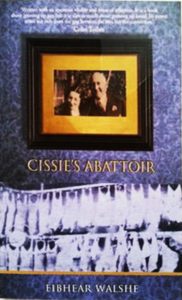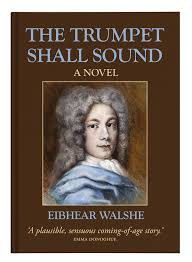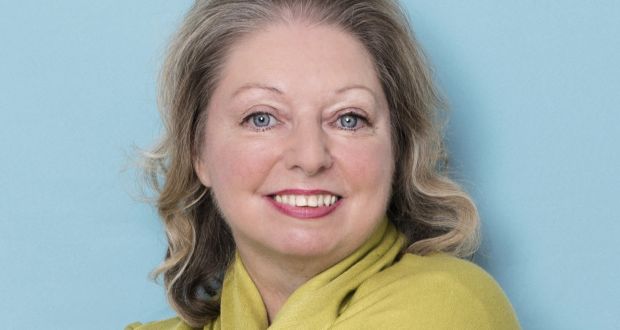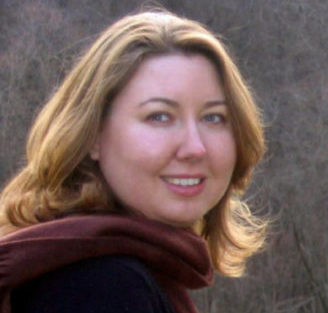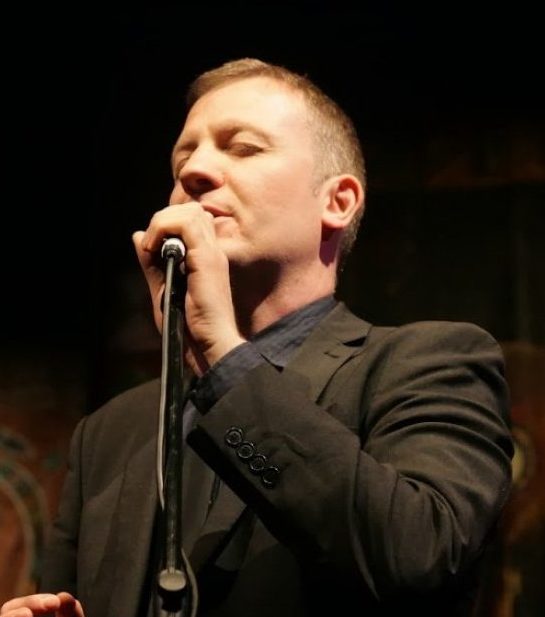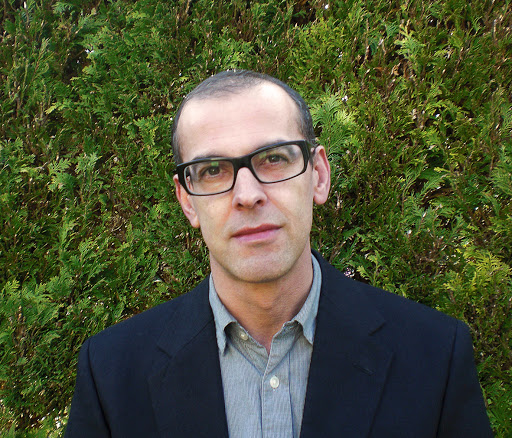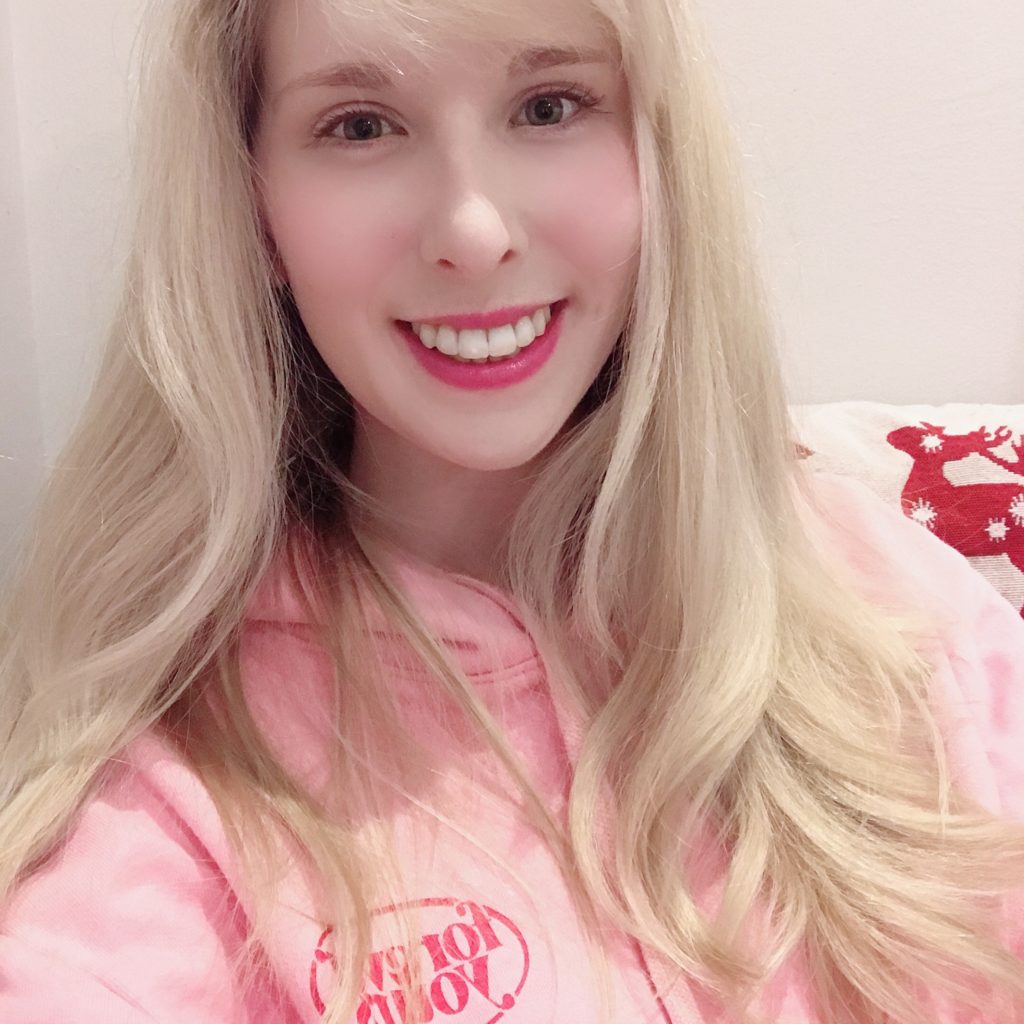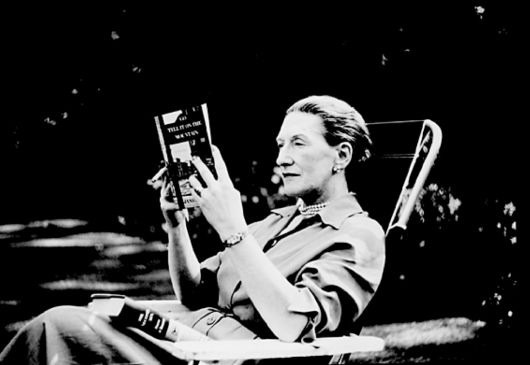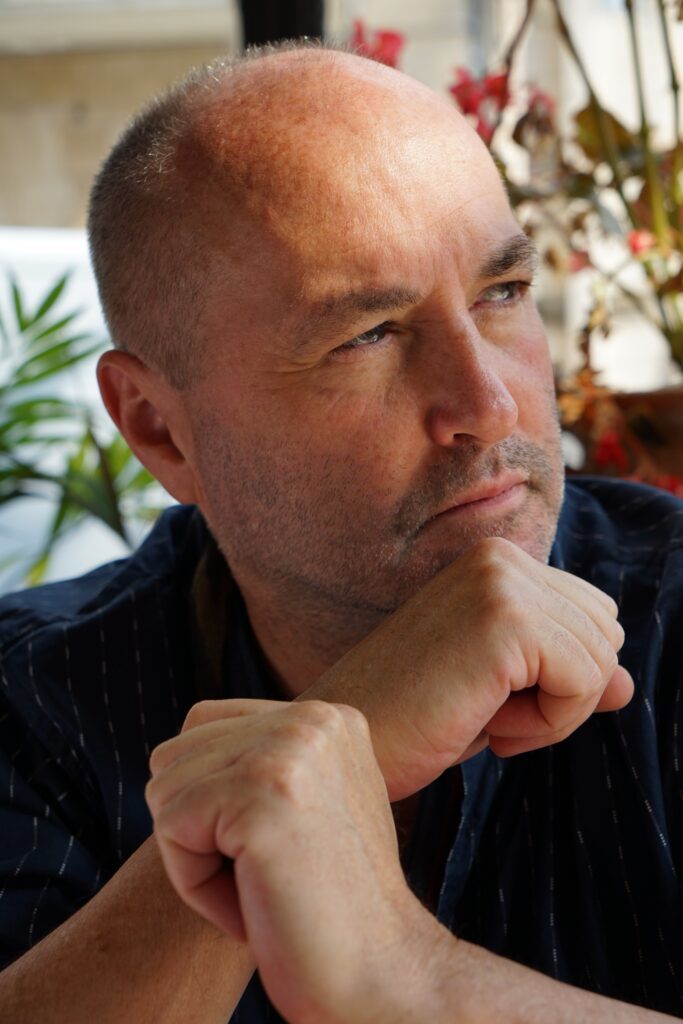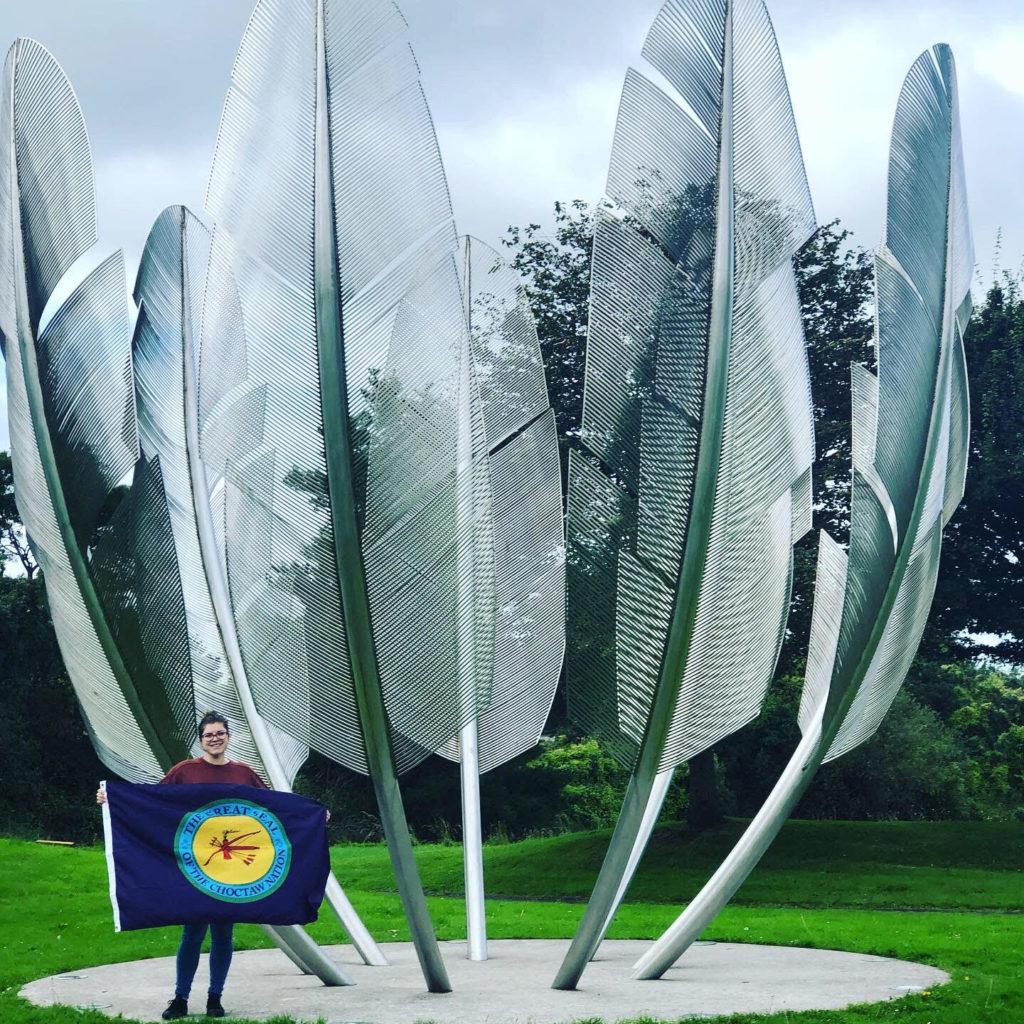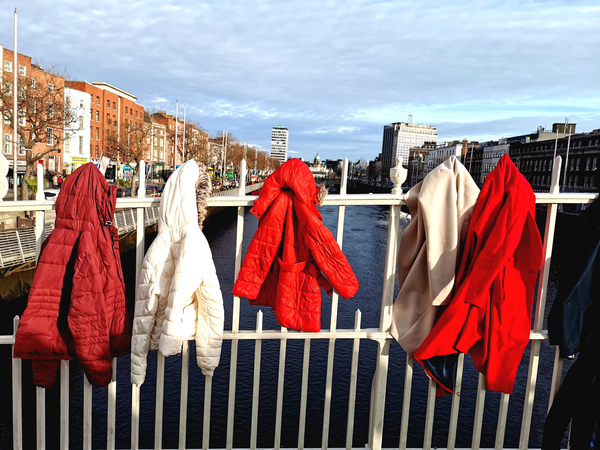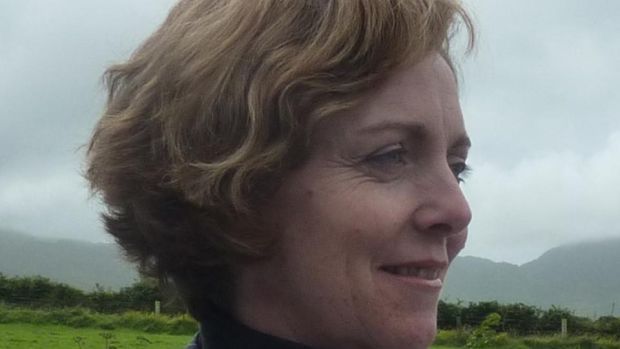On Saturday, February 22, Director of Creative Writing, Dr Eibhear Walshe will be interviewed about his memoir Cissie’s Abattoir and his novel, The Trumpet Shall Sound, at the 2020 OUTing the Past: LGBTQ+ History Festival at Cork City Hall. He will be part of a panel discussing “Activism, Imagination and Protest: Creativity through Necessity”.
Author Archives: Mary Morrissy
Hilary Mantel to read at UCC
Two-time Booker Prize winner Hilary Mantel is coming to UCC. Mantel’s reading will take place on Tuesday, May 19, in the Aula Maxima. The reading comes shortly after the publication in March of the much anticipated third volume in her Cromwell trilogy – The Mirror and the Light.
The reading has been made possible by the generous donation of a UCC alumna, whose love of reading prompted her endowment. The donor, who wishes to remain anonymous, will also sponsor a number of other high-profile readings on campus next semester, including espionage maestro John Le Carré, whose 25th novel Agent Running in the Field, appeared last year. (Date to be confirmed.)
Scotland’s “laureate-in-waiting” Ali Smith (winner of the Costa Novel of the Year, the Bailey’s and Goldsmiths Prizes) will read on September 22, following the August publication of Summer, the final novel in her acclaimed seasonal quartet series.
Finally on October 20, the 2004 Booker Prize winner (for The Line of Beauty) British novelist, journalist and translator, Alan Hollinghurst will round off the year’s readings.
All of our reading events are free and open to the public, although some of these events may be ticketed.
Poetry with an international flavour
Our next Department of English Reading Series event is a poetry special, showcasing three writers, Paula Bohince, Martin Veiga and Billy Ramsell who have strong connections with UCC, but whose work is international in flavour. The reading takes place at the Creative Zone, Boole Library, UCC @ 6.30pm, Monday, February 24.
Paula Bohince is UCC’s International John Montague Fellow in Poetry for 2020. From Pennsylvania, she is the author of three poetry collections, all from Sarabande: Swallows and Waves (January 2016), The Children (2012), and Incident at the Edge of Bayonet Woods (2008). Her poems have appeared in The New Yorker, The New York Review of Books, Granta, POETRY, The TLS, The Irish Times, Australian Book Review among others.
She has received the “Discovery”/The Nation Award, the Grolier Poetry Prize, the George Bogin Memorial Award from the Poetry Society of America, and Second Prize in the UK National Poetry Competition for her poem, “Among Barmaids.” She has taught at New York University, the New School and The Poetry School.
Martin Veiga is the author of five poetry collections in Galician, entitled Tempo van de porcelana (1990), As últimas ruínas (1994, Espiral Maior Poetry Prize), Ollos de ámbar (2005, Esquío Poetry Prize), Fundaxes (2006, Fiz Vergara Vilariño Poetry Prize) and Diario de Crosses Green (2016). He is a Cork-based Galician poet and academic. He is a lecturer in Hispanic Studies at UCC and the director of the Irish Centre for Galician Studies. In 2017 he was awarded the Pedrón de Honra Prize for his promotion of Galician culture abroad. His poems have been published and translated widely.
Billy Ramsell was born in Cork and educated at the North Monastery and UCC. Complicated Pleasures, his debut collection, was published by the Dedalus Press, Dublin, in 2007. He has been shortlisted for a Strong Award and a Hennessy Award. He lives in Cork, where he co-runs an educational publishing company. He was awarded the Ireland Chair of Poetry Bursary in 2013. His second collection is The Architect’s Dream of Winter (Dedalus , 2013). His translations from the Irish language have appeared in Poetry, The Stinging Fly, The Irish Times, Fusion, Transcript, The Penny Dreadful and Poetry International, and in Leabhar na hAthgabhála / Poems of Repossession from Bloodaxe Books.
The many sides of Colum McCann
Author Colum McCann read from his forthcoming novel, Apeirogon, at UCC this week and discussed the disruptive power of writing. MA student Debra Fotheringham was there.
Dublin-born writer, Colum McCann, calls himself an “Irish writer from New York,” and it was indeed all the way from his home in New York City that McCann travelled to treat the packed audience in UCC’s West Wing to a powerful reading from his new novel, Apeirogon. (The title comes from geometry – a generalized polygon with a countably infinite number of sides.)
Apeirogon is so new, in fact, that it is as yet unreleased, slated for publication next month from Random House.
The excerpt McCann read Tuesday evening was its Irish debut. Using a deliberately fractured narrative, the novel explores the world of conflict inhabited by two fathers, Palestinian, Bassam Aramin, and Israeli, Rami Elhanan, each reeling from the loss of a daughter to violence in the West Bank. In his reading, McCann chose passages that introduced us to his main characters, two real men whose lives were forever fractured and left bereft by violence, but somehow brought together by their shared loss.
Sharp, rich, and at times darkly humorous, McCann’s reading showed us two very different families with a mutual struggle to shape a kind of normalcy amidst an unsettling amalgam of domesticity and violence.
In the question and answer session after the reading, moderator Mary Morrissy, Associate Director of Creative Writing, asked a pertinent and topical question: does the writer (in this case a white male Irish/American writer) have the right to attempt to tackle the Palestinian/Israeli conflict in a novel?
McCann’s response was thoughtful and measured. “I think this idea of cultural appropriation and talking about it is fantastic and it’s so friggin’ necessary and there’s so much errant cultural appropriation going on that I salute those people that are calling it out. And I think it’s really kind of fantastic that they are calling it out. And another part of me also thinks that you have to be honest. When you enter a subject, it has to be full of absolute honesty and rather than appropriating from a culture, you’re celebrating a culture. Rather than looking down on a culture, you’re asking yourself, can you be allowed into a culture?
“This stuff is not easy; this stuff is contradictory; this stuff contains multitudes. It just strikes me that so much of what we do nowadays is one answer, whereas there are a number of different truths going on at once and one of the things we have to do at a university level and a personal level is to hold contradictory ideas in the palms of our hands at the same time.
“I have a complicated relationship with the idea of cultural appropriation and yet I will stand by my novel. And I do think people will take a whack at it. In fact, some people have. You’re not Israeli. How dare you? You’re not Palestinian. How dare you? But it is our story and the way we relate to others becomes a portrait of ourselves.”
Morrissy asked another difficult but important topical question: what do you think writing is for?
McCann responded, “I personally think writing is for change. I think writing is to throw people off their comfortable balance. I think writing is to disrupt. I think writing is to get in there and make people think differently or allow people to think differently. I think writing is social. I think writing is about action. I think all these things. And yet, on the other hand, I also know that writing, for someone else, can be just a very beautiful act of creating something like a poem or a paragraph or a whole novel that is just about the human spirit in itself. So I would not say that a writer has to be any one thing.”
McCann used the example of writers Emily Dickinson and Walt Whitman, contemporaries of each other. Where Dickinson wrote inside the mind, Whitman wrote outside the body but both created beautiful and vibrant work.
McCann’s reading and thoughtful responses to questions were rich with empathy. To us, his audience in the West Wing, he communicated a clear desire as a writer to be a kind of facilitator for seemingly disparate people to find common ground and understanding. He said, “I know my purpose, my own peculiar purpose [as a writer], is to use stories and storytelling to disrupt what’s going on and ask people, including myself and my kids and whoever else happens to be around, to question the narrative as it’s been given to us and maybe turn things around.”
Hats off to Hayley!
Good news for Hayley-Jenifer Brennan, one of our current MA students. Her story, “Undecided” is the featured read on The Book Smuggler’s Den, an online literary platform that publishes flash fiction, short stories, personal essays and poetry from new and emerging writers. https://booksmugglersden.com/portfolio/undecided/
The story was part of a portfolio she submitted for the fiction workshop module.
Congratulations to her from all on the MA.
BBC Radio 3 – The Emergency – Creative freedom in wartime Dublin
Director of Creative Writing, Eibhear Walshe is one of the contributors on a fascinating BBC Radio 3 documentary last night called ‘The Emergency – Creative freedom in wartime Dublin‘ where he talks about the north Cork writer, Elizabeth Bowen and her wartime activities.
Colum McCann to read at UCC
The distinguished Irish writer Colum McCann will read at UCC in the first event of the Department of English’s 2020 Reading Series.
McCann, who was born in Dublin, is the author of seven novels, including Transatlantic and Let the Great World Spin, and three collections of stories. His international honours include a National Book Award, the International Dublin Literary Award (formerly IMPAC) and a Chevalier des Arts et Lettres from the French government. He is a member of Aosdána and the American Academy of Arts.
His fiction has been published in over 40 languages. He lives in New York and teaches on the MFA programme in Hunter College, New York. His new novel, Apeirogon, will be published in February.
The reading takes place on Tuesday, January 28, West Wing 5 @6.30pm. Admission is free and all are welcome.
UCC’s first Choctaw scholar
Jessica Militante is the first recipient of a Choctaw Ireland Scholarship, created to commemorate the historic connection between the Choctaw and Irish people created during the Great Famine. Here she writes about her Choctaw – and Cork – roots.
When I think of my Choctaw ancestors, the first word that comes to mind is resilient. My people are the embodiment of the word. In 1831, the Choctaw people were forcibly removed from their land in the southeast of the United States due to President Andrew Jackson’s Indian Removal Act.
The Choctaws were the first nation to endure the march, which began in an exceptionally harsh winter and continued for several months, for over a thousand miles, to what is now Oklahoma. The unfathomable conditions, lack of resources, and the widespread of disease during the Trail of Tears lead to thousands of Choctaws’ deaths. Yet the Choctaw people did not allow this incomprehensible trauma to destroy them. They persevered.
Resilient is also a word that I associate with my Irish ancestors. The people of Cork endured the catastrophic event of the Great Famine a few years later, between 1845 and 1852. The scarcity of food was extreme, and the residents of Cork were starving and suffering from famine-related diseases. They were hungry and scared, and yet they too persevered.
These two resilient nations of my ancestry came together in the most remarkable way. In 1847, the Choctaw Nation of Oklahoma heard of the great hardship the people of Cork were facing and felt compelled to assist them. They raised $170, today’s equivalent of over $5,000, to aid the city of Cork in their time of need. The Choctaws gifted this money to Cork not from a position of wealth but from one of empathy. Having just lived through their own unimaginable tragedy, they identified with the suffering happening in Cork and, out of pure generosity and love for humankind, wanted to help.
This immeasurable act of humanity has never been forgotten by the people of Cork. It is the reason that there is a gorgeous sculpture of nine, twenty-feet, stainless steel eagle feathers in the town of Midleton. It is also the reason that I am able to study at University College Cork.
I am the first recipient of the Choctaw Ireland Scholarship, a scholarship created to commemorate the beautiful connection between the Choctaw and Irish people. Ireland is showing that same generosity and love for the Choctaw nation with this scholarship which is allowing me to study for my master’s in Creative Writing here at UCC.
The second term of my one-year master’s programme starts this week, and I have thoroughly enjoyed my past five months in Cork. Last semester, I had the pleasure of having afternoon tea with UCC’s president, Dr Patrick O’Shea, along with the recipient of the George Mitchell Scholarship, Minhal Ahmed. We spoke about the motivation behind the Choctaw scholarship, fun places to visit around Cork, and, of course, the weather! Having been born in and lived the majority of my life in California, Irish weather has certainly been an adjustment.
My five roommates are all from various places in Ireland which has made it so easy to learn more about Irish culture. Between them and my Cork classmates, it’s clear to see that generosity and human kindness is still very much alive in Ireland.
I have been to visit the Kindred Spirits sculpture in Midleton twice now, once with my mom and once with a fellow Choctaw student, Chayla Rowley, who is studying in Dublin as a Fulbright scholar. Each time that I go, I stand in the middle of the circle, my Choctaw flag wrapped around my shoulders as the eagle feathers stretch towards the sky around me and I am overwhelmed by the strength and love I feel.
Further developing my creative writing at UCC is helping me toward achieving my goal of publishing a young adult novel. Throughout my own childhood and adolescence, I strongly connected with the trials and triumphs of the characters I read about which I feel played a vital role in my desire to become a writer. I want to provide other young adults with the same joy of representation in the novels they read and hope to inspire a similar desire to share stories as the novels I read did in me.
I have yet to decide where I plan to live after graduating from UCC. In addition to California, I have previously lived in England and Japan, but Cork has been as welcoming as if I had lived here my whole life. All the possibilities are quite exciting, and I look forward to what my future holds for me.
I am so honoured to receive this opportunity and proud of both my Choctaw and Irish ancestors for their immeasurable acts of resilience and generosity. Such acts are so rare, and I am thrilled to help in some small way to keep this connection strong.
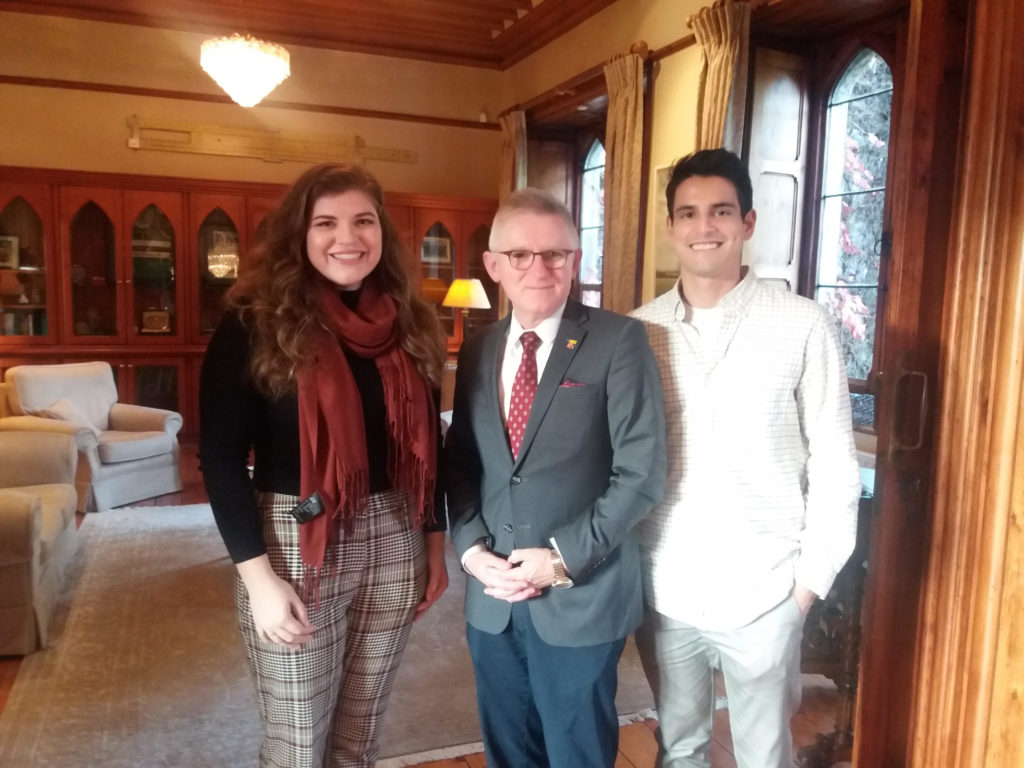
Jessica Militante with UCC president, Dr Patrick O Shea, and Minhal Ahmed, recipient of the George Mitchell scholarship for 2019/20.
No jackets required
Coats left for the homeless last week on Ha’penny Bridge, Dublin, were later removed by Dublin City Council for causing ‘congestion’. Here is MA in Creative Writing graduand, poet Molly Twomey’s timely response, featured on Broadsheet – https://www.broadsheet.ie/2019/12/16/no-jackets-required
Zip It
We ask you to kindly halt
leaving your parkas and jackets
to warm the homeless
for we cannot have tourists
distracted from their whiskey
lattes and Aran jumpers.
They’ll stop taking selfies,
we’ll have nothing left
to post on Lovin’ Dublin.
We have given your coats
to Oxfam for students
to buy, resell, repay their loans.
Your woollen hats and mittens
are a real congestion issue.
People are bumping
into each other like scabies
on a child’s elbow.
If they really want a home,
they’d apply for the HAP
scheme on their iPhones.
Look, we can’t build more shelters
or estates, we just gave 23 million
to a rafting course; kayaking,
water polo. We don’t mind
stags and hens pissing
down Camden’s Place, snorting
coke off Molly Malone’s tits.
At least they’re not setting up
tents like whack-a-moles
outside the church,
making it hard to stomach
our tuna melts. Feeling guilt
when we tuck in
the bathed skin of our children
under plastic moons
and glow in the dark stars.
Fair Day for Laura!
Congratulations to our newly conferred doctor in creative writing, Laura McKenna, who has just been announced as one of twelve finalists in the Irish Writers Centre Novel (IWC) Fair 2020. (https://irishwriterscentre.ie/blogs/news/announcing-the-novel-fair-2020-finalists)
This year’s winners were selected by author-judges Christine Dwyer-Hickey, Niamh Boyce and Kevin Curran. The finalists will have the opportunity to pitch their novels directly to some of the top names in publishing across Ireland and the UK at an event in the IWC in February.
Laura’s submission to the Fair is her doctoral novel, Words to Shape my Name. An historical novel, it’s based on the life of Tony Small, an escaped slave who journeyed to the heart of revolutionary Ireland in the late 18th century as the manservant of Lord Edward Fitzgerald.
The novel has already been long-listed for the Bath Novel Award 2019, and an article drawn from the critical research portion of Laura’s thesis has been accepted for publication in History Ireland in 2020.
Now in its ninth year, the Novel Fair has resulted in 20 success stories, giving aspiring writers the chance to kick-start their literary career. Last year, five of the 12 finalists secured publishing deals. Previous Novel Fair winners include Catriona Lally who was recently awarded the prestigious Lannan Literary Prize worth $100,000.

